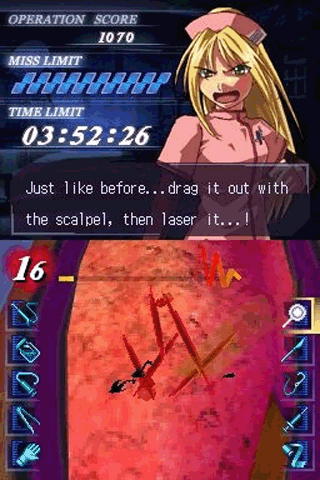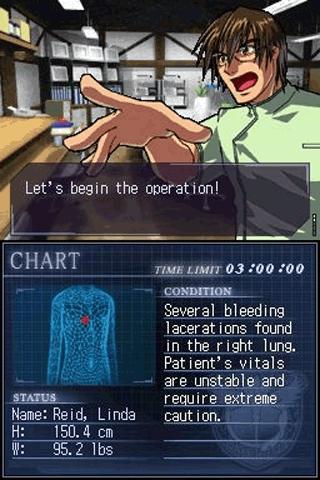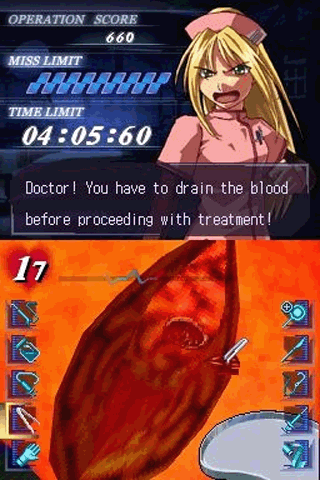If you think I’ll make it through this entire review without making any “playing doctor” puns, you haven’t been reading enough GameCola.
Trauma Center: Under the Knife puts you behind the scalpel of Derek Stiles, a newbie doctor who, at the onset of the game at least, doesn’t quite seem cut out for medicine. With his flippant attitude and his tendency to do harm more often than heal, he might be better suited for Envelope Stuffing V, or Let’s Mop the Floors: In 3D!
When he’s not “playing doctor” (so to speak) with his various mentors, nurses, and patients, Dr. Stiles learns a thing or two about life, his responsibilities, and his newfound powers to slow down time. He also unravels a plot of medical warfare against mankind, and it’s around this point that you’ll start to wonder when Trauma Center became a dodgy TNT movie.
You’ll start wondering about that pretty early on in the game, actually. When it gets to the bits (about a third of the way into the game) about dismantling these diseases forged by terrorists hell-bent on something or another, the game evolves from a surgery sim to your everyday puzzle game. Granted, I don’t have anything against your everyday puzzle game, but you’d think the medical profession would be chock-full of enough entertaining diseases and ailments that Trauma Center‘s developers wouldn’t have to resort to Bust-a-Move for inspiration.
The gameplay (or “playing doctor”, as you could say) involves scratching away at your DS’s touch screen with your stylus in ways that vaguely (though fun-ly) resemble the ways of a surgeon. You’ll use your stylus as a scalpel, cutting your patient open and hacking away at his internal organs. You’ll use it as a laser, zapping away tumors (and spiders, later on when the game goes off the deep end.) You’ll use it to apply bandages, inject serums, and massage hearts (and tweezer out little triangles later on when the game goes off the deep end.) D-pad and the gang are all but completely neglected in Trauma Center, though you’ll hardly miss them.
The action is fast-paced and heart-pounding, and an entirely unnecessary timer makes it even more so. As it turns out, in the medical world, if you don’t complete an operation within five minutes, another more experience doctor will sidle up and shove you out of the way, claiming your patient as his own. This occurs even if the timer runs out just as you’re bandaging your patient up and telling him that everything’s gonna be just fine. You’re also just shoved out of the way if you screw up too many times or if your patient’s hit points hit zero, so you never get the satisfaction of seeing your patients die by your hands.
After completing an operation in Story Mode, you unlock it in Challenge Mode, wherein you try for the highest score possible by acting quickly, surely, and by not killing your patient all that much. This is about it for replay value, as the story mode isn’t compelling enough to give it another go. Also, this game is short. Real short. Beating it in 10 hours means stretching the game to its absolute limit, getting the highest score possible on all the challenges and playing through the entire story without getting bored and/or frustrated and giving up. You can easily get all you want out of this title in much less time than that, making Trauma Center one of the shortest DS titles this side of Dig Dug.
Trauma Center controls like a dream. Albeit a dream that involves shooting heart-spiders with a surgical laser, but a dream nonetheless. The only problem I ever encountered was again in applying bandages—somehow, the game thinks that applying a bandage a half-centimeter above where a cut ends is akin to stabbing the patient in the face with my scalpel. I lost a few difficult levels after making that mistake. Other than that, targeting is top-notch, though it’ll take you several operations to figure out what all your instruments do and when you’re supposed to use them. Your assistants aid you in this for the first few operations, but before long, you’re own your own and probably clueless. It’s a lot like college.
Both graphics and audio are surprisingly reminiscent of Phoenix Wright: Ace Attorney; surprisingly because the two games were made by two entirely different companies. Both titles use the same anime-ish style of graphics, though good ol’ P.W. sports a few more songs. The game’s music never really takes you out of the action, but you won’t miss out on much if you’re watching Dirty Jobs while you play.
This game would’ve been much more fun if the last two thirds were lopped right off, and the gameplay of the first third was expanded to include more real-life situations. The terrorism stuff just gets too silly, with diseases that don’t even come close to something that could possibly be considered real. It’s as if the developers decided halfway through that, oops, they wanted to make a puzzle game instead. The puzzle levels aren’t horrible for what they are, but they’re pretty bad for what they could’ve been.
Between the doctor game and the lawyer game, the lawyer game is the definite way to go, though from what I understand it’s become difficult to actually find. Trauma Center works great as a rental, works great as a borrow-from-a-friend, and works great as a game to play for a few hours if you’ve got nothing else to do. But I can’t recommend it for anything more than that. Maybe we’ll get a Trauma Center 2, and with any luck, maybe that Trauma Center 2 won’t be going through an identity crisis.



